一般将来时课件will的用法
- 格式:ppt
- 大小:2.12 MB
- 文档页数:16
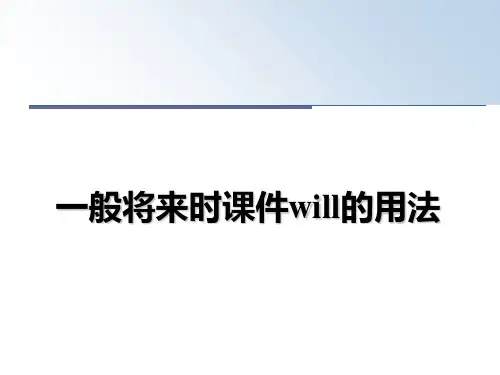
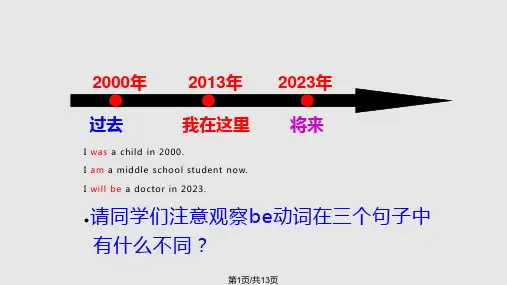


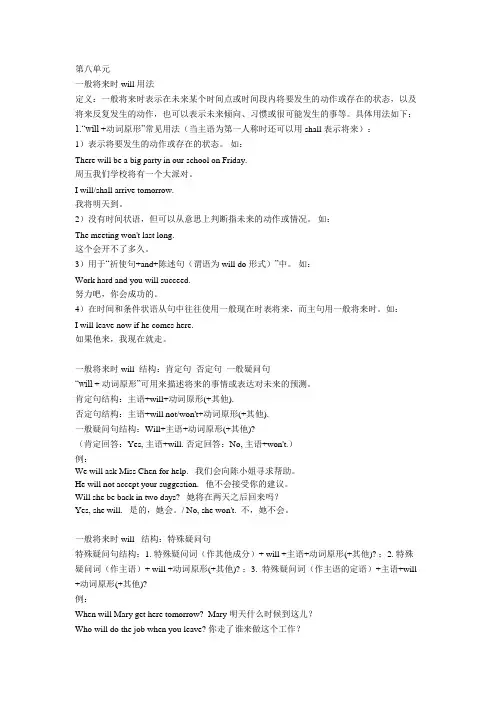
第八单元一般将来时will 用法定义:一般将来时表示在未来某个时间点或时间段内将要发生的动作或存在的状态,以及将来反复发生的动作,也可以表示未来倾向、习惯或很可能发生的事等。
具体用法如下:1.“will +动词原形”常见用法(当主语为第一人称时还可以用shall表示将来):1)表示将要发生的动作或存在的状态。
如:There will be a big party in our school on Friday.周五我们学校将有一个大派对。
I will/shall arrive tomorrow.我将明天到。
2)没有时间状语,但可以从意思上判断指未来的动作或情况。
如:The meeting won't last long.这个会开不了多久。
3)用于“祈使句+and+陈述句(谓语为will do形式)”中。
如:Work hard and you will succeed.努力吧,你会成功的。
4)在时间和条件状语从句中往往使用一般现在时表将来,而主句用一般将来时。
如:I will leave now if he comes here.如果他来,我现在就走。
一般将来时will 结构:肯定句否定句一般疑问句“will + 动词原形”可用来描述将来的事情或表达对未来的预测。
肯定句结构:主语+will+动词原形(+其他).否定句结构:主语+will not/won't+动词原形(+其他).一般疑问句结构:Will+主语+动词原形(+其他)?(肯定回答:Yes, 主语+will. 否定回答:No, 主语+won't.)例:We will ask Miss Chen for help. 我们会向陈小姐寻求帮助。
He will not accept your suggestion. 他不会接受你的建议。
Will she be back in two days? 她将在两天之后回来吗?Yes, she will. 是的,她会。
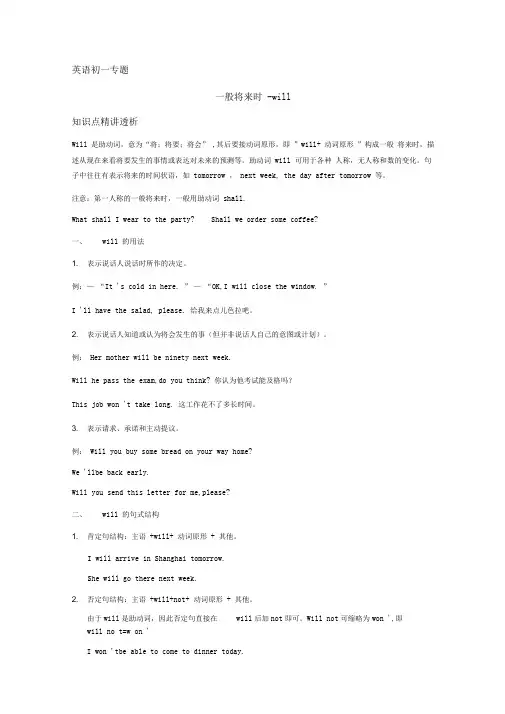
英语初一专题一般将来时 -will知识点精讲透析Will 是助动词,意为“将;将要;将会” ,其后要接动词原形,即”will+ 动词原形”构成一般将来时,描述从现在来看将要发生的事情或表达对未来的预测等。
助动词will 可用于各种人称,无人称和数的变化。
句子中往往有表示将来的时间状语,如tomorrow ,next week, the day after tomorrow 等。
注意:第一人称的一般将来时,一般用助动词shall.What shall I wear to the party? Shall we order some coffee?一、will 的用法1. 表示说话人说话时所作的决定。
例:—“It 's cold in here. ”—“OK,I will close the window. ”I 'll have the salad, please. 给我来点儿色拉吧。
2. 表示说话人知道或认为将会发生的事(但并非说话人自己的意图或计划)。
例:Her mother will be ninety next week.Will he pass the exam,do you think? 你认为他考试能及格吗?This job won 't take long. 这工作花不了多长时间。
3. 表示请求、承诺和主动提议。
例:Will you buy some bread on your way home?We 'llbe back early.Will you send this letter for me,please?二、will 的句式结构1. 肯定句结构:主语+will+ 动词原形+ 其他。
I will arrive in Shanghai tomorrow.She will go there next week.2. 否定句结构:主语+will+not+ 动词原形+ 其他。
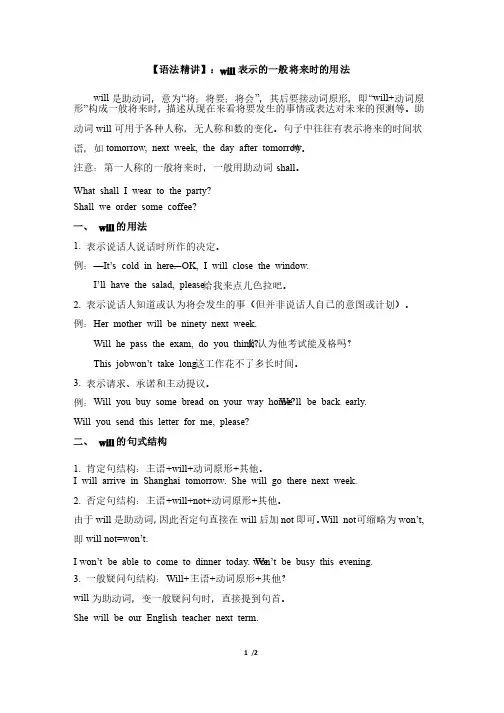
【语法精讲】:will 表示的一般将来时的用法will 是助动词,意为“将;将要;将会”,其后要接动词原形,即“will+动词原形”构成一般将来时,描述从现在来看将要发生的事情或表达对未来的预测等。
描述从现在来看将要发生的事情或表达对未来的预测等。
助助动词will 可用于各种人称,无人称和数的变化。
句子中往往有表示将来的时间状语,如tomorrow, next week, the day after tomorrow 等。
等。
注意:第一人称的一般将来时,一般用助动词shall 。
What shall I wear to the party? Shall we order some coffee? 一、 will 的用法1. 表示说话人说话时所作的决定。
表示说话人说话时所作的决定。
例:—It’s —It’s cold in here. cold in here. ―OK,―OK, I will close the window. I will close the window. I’ll I’ll have the salad, please. have the salad, please. 给我来点儿色拉吧。
给我来点儿色拉吧。
2. 表示说话人知道或认为将会发生的事(但并非说话人自己的意图或计划)。
例:Her mother will be ninety next week. Will he pass the exam, do you think? 你认为他考试能及格吗?你认为他考试能及格吗?This job w on’t won’t won’t take long. take long.这工作花不了多长时间。
这工作花不了多长时间。
3. 表示请求、承诺和主动提议。
表示请求、承诺和主动提议。
例:Will you buy some bread on your way home? We’ll We’ll be back early. be back early. Will you send this letter for me, please? 二、 will 的句式结构1. 肯定句结构:主语+will+动词原形+其他。
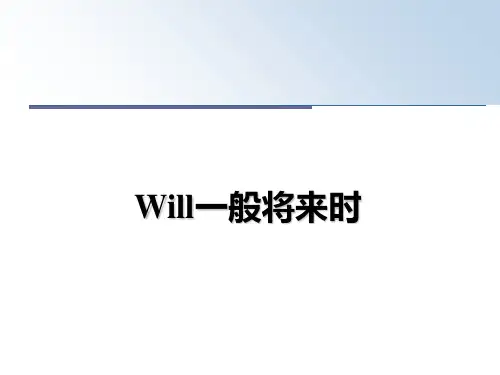


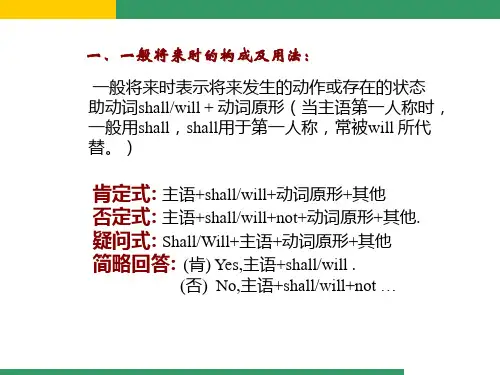
【语法精讲】:will表示的一般将来时的用法will是助动词,意为“将;将要;将会”,其后要接动词原形,即“will+动词原形”构成一般将来时,描述从现在来看将要发生的事情或表达对未来的预测等。
助动词will 可用于各种人称,无人称和数的变化。
句子中往往有表示将来的时间状语,如tomorrow, next week, the day after tomorrow等。
注意:第一人称的一般将来时,一般用助动词shall。
What shall I wear to the party?Shall we order some coffee?一、will的用法1. 表示说话人说话时所作的决定。
例:—It’s cold in here. ―OK, I will close the window.I’ll have the salad, please. 给我来点儿色拉吧。
2. 表示说话人知道或认为将会发生的事(但并非说话人自己的意图或计划)。
例:Her mother will be ninety next week.Will he pass the exam, do you think? 你认为他考试能及格吗?This job won’t take long.这工作花不了多长时间。
3. 表示请求、承诺和主动提议。
例:Will you buy some bread on your way home? We’ll be back early.Will you send this letter for me, please?二、will的句式结构1. 肯定句结构:主语+will+动词原形+其他。
I will arrive in Shanghai tomorrow. She will go there next week.2. 否定句结构:主语+will+not+动词原形+其他。
由于will是助动词,因此否定句直接在will后加not即可。